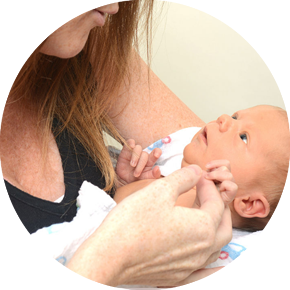What A New Baby Expects – From Birth to Going Home

 As new mothers, we expect to parent the way we have learned to parent – and there are many different styles.
As new mothers, we expect to parent the way we have learned to parent – and there are many different styles.
But a baby's 'expectations' are not learned.
They are the instincts and reflexes of all babies around the world, and they are the same as they were thousands of years ago.
Babies are not helpless. They are highly skilled for the world they "expect" to be born into.
When we change their world, we make life harder for them.
You may not want to live in a cave with your baby, but it helps to know what your baby 'expects' the start of life to be like.
What A Baby Expects During The Birth
During the birth, she expects not to have to deal with drugs. The drug that affects you for only a few hours can cause her problems for days, making it hard for her to nurse with normal efficiency and frequency.
If you're trying to decide about a medication, remember that your decision can affect much more than the birth.
Some babies need to be born surgically, and that's okay. I'm very sure both you and your baby would rather a safe birth than not.
But by understanding that interventions can make it harder for your baby, it may help you to support your baby as best possible, and focus on what you can do to make it easier.
Immediately After the Birth
Immediately after the birth, your baby expects to stay with you.
After he spends some time next to your skin, getting used to breathing and seeing and hearing, he'll begin to think about his first meal, and he can actually crawl 'commando style' right up to your breast, find your nipple, latch on, and have a long nursing, with no help from anyone!
If he is taken away from you to be washed and measured before his first nursing, or if he has drugs to cope with, he may not be able to complete those first activities as well, and your own instinctive responses to him will be changed.
Breastfeeding works just fine under all kinds of birth circumstances, but it is easiest and most thrilling for both of you if your time together is unbroken until after that first nursing.
What A Baby Expects After Her First Feed
After her first feed, she expects a long sleep at your side or in your arms.
She has heard your heart and breathing and has felt your warmth all her life, and she will actually have a steadier heart and breathing rate herself if she stays in touch with you.
She may want to sleep longer than the hospital staff would like her to.
They want to make sure that everyone's plumbing works before you go home, so you may have to fight nature a bit to encourage frequent nursings at first. But she'll soon be waking on her own, nursing, and letting go when she's satisfied, just like any other baby mammal.
What A Baby Expects At Home
At home he expects to stay close to you.
All mammal babies have some way to protect themselves: speed, camouflage, safety in numbers. Human babies protect themselves by being held.
He'll feel safest and calmest when he's next to you, where the tigers can't eat him and the ants can't crawl on him! He expects to set his own pace – probably nursing more often than you imagined – finishing one breast before starting the other, and perhaps not wanting both breasts each time.
He expects you to respond quickly to his sounds, and he expects not to have to cry for what he needs. He expects to be near you at night as well as during the day, and will probably sleep better with you next to him.
Your baby 'expects' to be in your arms and 'expects' you to listen to him, not to a clock or an instruction book. If you meet his expectations, you'll have a happier baby. And that means a happier life together.

